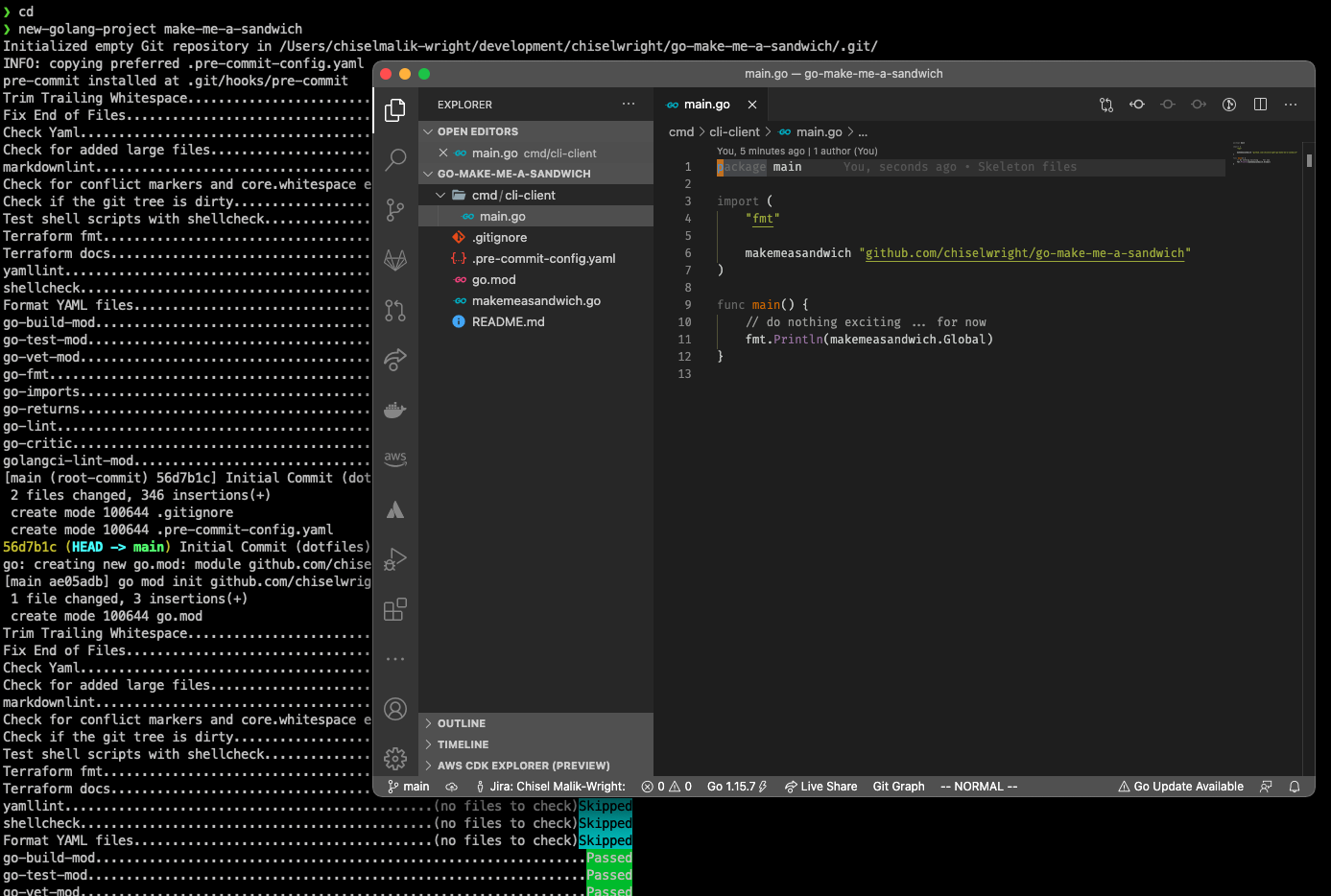Create New Golang Projects

Continuing our desire to be lazy efficient and automate common tasks, this is about a little helper for any new golang projects we create.
Continuing our desire to be lazy efficient and automate common tasks,
this is about a little helper for any new golang projects we create.
- this unordered seed list will be replaced by the toc
The Explanation
I started learning, and using, golang in late-2020. As my familiarity
increased I realised I was repeating the same boring steps each time I
created a new repository. Being who I am, I couldn’t keep repeating myself,
so I wrote a script to repeat myself for me.
Because I wrote the script for myself it does make some assumptions, some of which you can override, some of which you’re stuck with unless you modify the script.
Assuming everything succeeds, the script will check to see if you have code
(the wrapper script that launches VSCode) and open the new repository for you
automatically.
The Script
Save this into your path (e.g. ~/bin).
# file: "new-golang-project"
#!/bin/bash
set -euo pipefail
# grab $1 as the "original module name"
origname="${1:?missing reponame}"
# start with reponame as the origname, then prefix with go- if we don't have it
reponame="${origname}"
[[ $reponame =~ ^go- ]] || reponame="go-${reponame}"
# and trimname, get the reponame without the go-prefix; useful for packages
trimname="${reponame/go-/}"
# also, we don't want dashes!
trimname="${trimname//-/}"
# set a couple of things we may wish to make more configurable down the line:
## a github username (default: chizmw)
githubUsername="${GITHUB_USERNAME:-chizmw}"
## the module name prefix (default: github.com/${githubuserName})
gomodPrefix="${NEWGO_MODPREFIX:-github.com/${githubUsername}/}"
## cloneRoot is the base for "development" checkouts (default: ~/development)
### we use CLONEINTO_ROOT as that matches what we're using in git-initial-commit
cloneRoot="${CLONEINTO_REPO:-~/development}"
## pathPrefix .. appends the username to the cloneRoot
pathPrefix=${cloneRoot}/${githubUsername}
# expand any ~
# https://stackoverflow.com/questions/3963716/how-to-manually-expand-a-special-variable-ex-tilde-in-bash/27485157#27485157
pathPrefix="${pathPrefix/#\~/$HOME}"
# if we already exist, don't do anything
if [ -d "${pathPrefix}/${reponame}" ]; then
echo "# repository dorectory '${pathPrefix}/${reponame}' already exists"
else
mkdir -p "${pathPrefix}/${reponame}"
cd "${pathPrefix}/${reponame}"
# run our magical little repo creator
git initial-commit
# initialise the go module
go mod init ${gomodPrefix}${reponame}
git add go.mod
git commit -v --no-verify -m "go mod init ${gomodPrefix}${reponame}"
# create a shell of a main.go, to give us something to test with
mkdir -p cmd/cli-client
cat <<EOF >cmd/cli-client/main.go
package main
import (
"fmt"
${trimname} "${gomodPrefix}${reponame}"
)
func main() {
// do nothing exciting ... for now
fmt.Println(${trimname}.Global)
}
EOF
# create a simple initial module for main.go to work
cat <<EOF >${trimname}.go
package ${trimname}
// Global is just a thing you should delete
var Global string = "Hello World"
EOF
cat <<EOF >README.md
# ${reponame}
## Installation
~~~sh
go get ${gomodPrefix}${reponame}
~~~
## cli-client
You can experiment with the library by running:
~~~sh
go run ./cmd/cli-client/main.go
~~~
EOF
git add .
git commit -m 'Skeleton files'
# if it were just me, I'd just use `git tt` here, but let's have a fallback
# for people that aren't me
git tt 2>/dev/null ||
git log --decorate \
--pretty=format:'%Cred%h %C(blue)[%G?] %Cgreen[%cr] %C(bold black)<%an>%Creset%C(yellow)%d %Creset %s%Creset' \
--date=relative \
-n 10
echo "# ${reponame} created in ${pathPrefix}/${reponame}"
fi
if type code >/dev/null; then
code -g ./cmd/cli-client/main.go "${pathPrefix}/${reponame}"
fi
Assumptions
It uses git initial-commit
I wrote about this recently, and it’s my preferred way to get a new git
repo up and running.
You can read more about this in the blog entry.
If you really don’t want this, you can probably just replace the line with:
git init
It assumes you’re releasing to github, as me
The module name is automatically written in a “github friendly” manner. For
example flizz becomes module github.com/chizmw/go-flizz
You can alter the prefix by setting the following in your shell:
export GITHUB_USERNAME="myusername"
It assumes you’re using ~/development
By default clone-into-dir will use ~/development as the root location for
all clone actions.
If you prefer to have your code somewhere else you can set a variable in your shell:
export CLONEINTO_ROOT=/path/to/your/preference
This value was chosen to match can read more about this in the
clone-into-dir post.
Source
Just in case the script moves on after the article is published, here’s the source file
In Action
When you run the script you will see something like this. Output truncated for artistic brevity.

